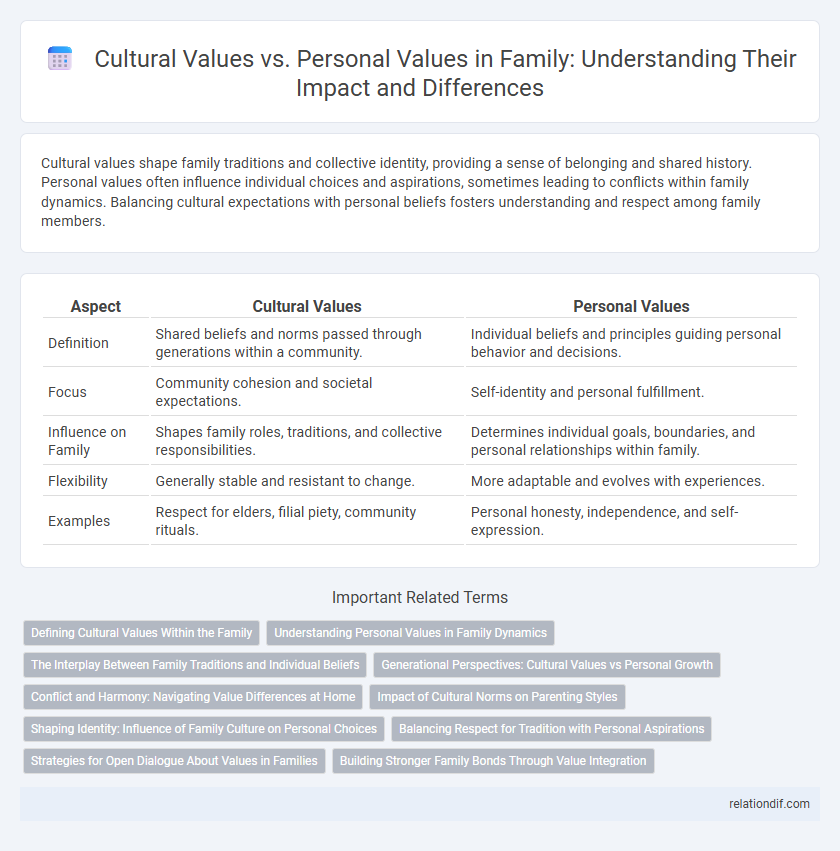Cultural values shape family traditions and collective identity, providing a sense of belonging and shared history. Personal values often influence individual choices and aspirations, sometimes leading to conflicts within family dynamics. Balancing cultural expectations with personal beliefs fosters understanding and respect among family members.
Table of Comparison
| Aspect | Cultural Values | Personal Values |
|---|---|---|
| Definition | Shared beliefs and norms passed through generations within a community. | Individual beliefs and principles guiding personal behavior and decisions. |
| Focus | Community cohesion and societal expectations. | Self-identity and personal fulfillment. |
| Influence on Family | Shapes family roles, traditions, and collective responsibilities. | Determines individual goals, boundaries, and personal relationships within family. |
| Flexibility | Generally stable and resistant to change. | More adaptable and evolves with experiences. |
| Examples | Respect for elders, filial piety, community rituals. | Personal honesty, independence, and self-expression. |
Defining Cultural Values Within the Family
Cultural values within the family serve as collective beliefs and practices passed down through generations, shaping traditions, rituals, and social roles. These values influence how family members communicate, make decisions, and resolve conflicts, often emphasizing respect, loyalty, and interdependence. Understanding cultural values is essential for balancing personal beliefs while maintaining family cohesion and identity.
Understanding Personal Values in Family Dynamics
Personal values shape individual behavior and influence decision-making within family dynamics, often reflecting deeply held beliefs about responsibility, respect, and love. Understanding these personal values helps in recognizing differing perspectives and fostering empathy among family members. The interplay between cultural values and personal values can either create harmony or conflict, highlighting the importance of open communication and mutual respect in family relationships.
The Interplay Between Family Traditions and Individual Beliefs
Family traditions deeply influence cultural values, shaping collective identity and social norms passed through generations. Personal beliefs often emerge as individuals interpret or challenge these traditions, creating a dynamic interplay between inherited customs and self-developed principles. This interaction fosters both continuity and evolution within families, balancing respect for heritage with personal authenticity.
Generational Perspectives: Cultural Values vs Personal Growth
Generational perspectives within families often highlight the tension between cultural values rooted in tradition and the pursuit of personal growth emphasized by younger members. Elders typically prioritize collective identity, respect for heritage, and communal responsibilities, while younger generations seek autonomy, self-expression, and adaptability to contemporary societal norms. This dynamic shapes family interactions and influences how values are negotiated across age groups, impacting identity formation and intergenerational relationships.
Conflict and Harmony: Navigating Value Differences at Home
Cultural values often shape family traditions and expectations, creating a framework within which personal values are expressed or challenged. Conflicts arise when individual beliefs diverge from collective norms, leading to tension but also opportunities for dialogue and growth. Navigating these differences requires empathy and open communication to achieve harmony and mutual respect in the family dynamic.
Impact of Cultural Norms on Parenting Styles
Cultural norms heavily influence parenting styles by shaping beliefs about discipline, communication, and family roles, often prioritizing collective harmony over individual expression. In collectivist cultures, parents emphasize obedience, respect for elders, and interdependence, whereas individualistic societies encourage independence and self-expression. These culturally rooted parenting approaches significantly impact children's development, emotional well-being, and social behavior.
Shaping Identity: Influence of Family Culture on Personal Choices
Family culture plays a crucial role in shaping personal identity by embedding deep-rooted cultural values that influence individual decision-making and lifestyle preferences. These inherited beliefs often guide choices in career paths, relationships, and traditions, reflecting a blend of communal expectations and personal aspirations. Understanding the interplay between family culture and personal values fosters a nuanced sense of self that balances collective heritage with individual expression.
Balancing Respect for Tradition with Personal Aspirations
Balancing respect for cultural values with personal aspirations requires navigating family traditions while honoring individual goals. Maintaining open communication fosters mutual understanding between generations, allowing personal growth without disregarding heritage. Emphasizing empathy in familial relationships encourages support for personal values alongside collective cultural identity.
Strategies for Open Dialogue About Values in Families
Establishing regular family meetings and creating a safe space for expressing diverse opinions fosters open dialogue about cultural and personal values. Using active listening techniques and validating each member's experiences encourages mutual respect and understanding. Incorporating storytelling and shared family experiences helps bridge generational differences and align values effectively.
Building Stronger Family Bonds Through Value Integration
Integrating cultural values such as respect, tradition, and collective responsibility with personal values like individuality, honesty, and empathy fosters stronger family bonds by encouraging mutual understanding and acceptance. Families that actively blend intergenerational customs with personal aspirations create an environment where emotional support and open communication thrive. This balanced approach enhances resilience and unity, ensuring lasting connections across diverse family dynamics.
Cultural values vs Personal values Infographic

 relationdif.com
relationdif.com